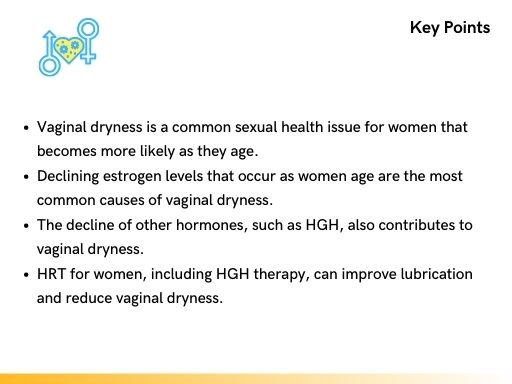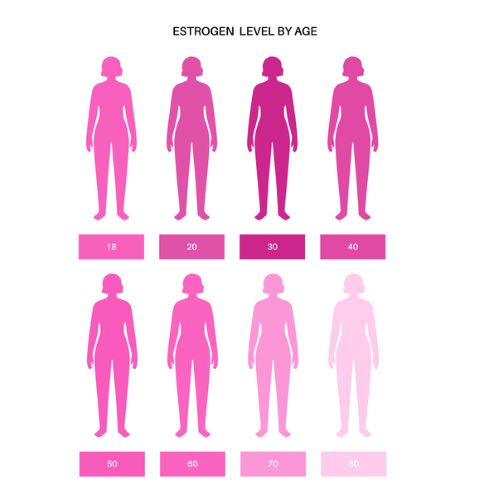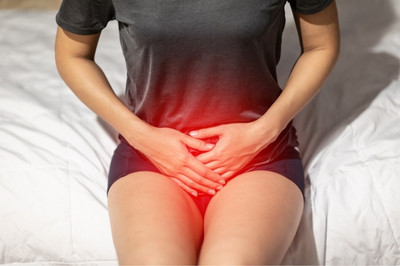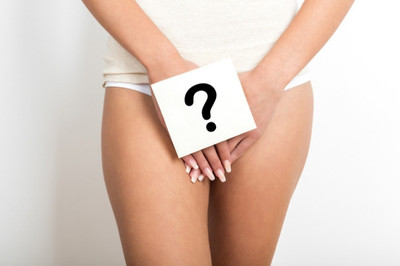 A thin layer of moisture or lubrication coats the inner walls of the vagina, which helps to facilitate intercourse and promote the mobility and survival of sperm.
A thin layer of moisture or lubrication coats the inner walls of the vagina, which helps to facilitate intercourse and promote the mobility and survival of sperm.
However, aging, hormonal changes, and other issues can cause vaginal dryness, a common form of female sexual dysfunction.
The most common cause of vaginal dryness is the drop in female hormones that occur as women age; however, a loss of natural lubrication can have other causes as well.
Vaginal dryness is not only an embarrassing and uncomfortable condition, but it can also have a dramatic impact on a woman’s ability to enjoy sex, and, therefore, on her quality of life.
How Common is Vaginal Dryness in Women?
Vaginal dryness is a fairly common condition in women, becoming far more prevalent as women age. Approximately 17% of all “premenopausal” women between the ages of 18 and 58 report vaginal dryness at one time or another that interfered with sexual intercourse. That number rises to over 50% in menopausal and post-menopausal women.
What Causes Vaginal Dryness
 Under normal conditions, the walls of the vagina are lubricated by a thin layer of clear fluid. This lubrication increases upon stimulation and sexual arousal. The hormone estrogen plays a critical wall in producing and maintaining that lubrication and otherwise keeping the skin of the vagina supple, healthy, and youthful.
Under normal conditions, the walls of the vagina are lubricated by a thin layer of clear fluid. This lubrication increases upon stimulation and sexual arousal. The hormone estrogen plays a critical wall in producing and maintaining that lubrication and otherwise keeping the skin of the vagina supple, healthy, and youthful.
As estrogen levels drop with age, lubrication lessens. Vaginal dryness is a common menopausal symptom, one of the most common, right behind hot flashes and night sweats. Any other condition besides aging that causes a reduction in the production of estrogens, such as cancer, cancer treatments, or hysterectomy, can also cause vaginal dryness.
Age-related hormone loss is the main cause of vaginal dryness in women, but it can happen at almost any age, and lack of lubrication can have causes other than hormonal imbalances. Non-hormonal causes for vaginal dryness, also known as “vaginal atrophy,” include:
- Sjögren’s syndrome (an autoimmune disorder that attacks cells in the body that produce moisture)
- Allergies
- Certain medications, such as cold medicines and antidepressants
- Excess douching
- Not enough stimulation and foreplay before intercourse
Can Hormonal Imbalance be a Cause of Vaginal Dryness?
Vaginal lubrication is regulated by hormones; therefore, a hormone imbalance is almost always the cause of vaginal dryness. Vaginal dryness becomes far more common as a woman surpasses the age of 45. Not coincidentally, this is the same age that most women start to feel “perimenopausal” symptoms as estrogen levels start to drop significantly. This time is known as perimenopause because a woman may still be ovulating and having menstrual periods, so she is not in full “menopause,” but female hormone levels have dropped low enough for her to experience “menopause-like” symptoms, not the least of which is vaginal dryness and other sexual health issues such as loss of sex drive, painful intercourse, and difficulty achieving orgasm.
The hormone most related to vaginal health and vaginal lubrication is estrogen. But other hormones also play a role, some that are not even “female” hormones, such as testosterone and human growth hormone (HGH).
What Is a Normal Amount of Vaginal Lubrication?
 There is not a quantitative amount or “volume” of vaginal fluid that is considered “normal” or “dry.” It is more of a personal thing that is “felt” and not measured. If your vagina is dry enough to cause itching, burning, or other discomfort, particularly during intercourse, then you are likely not producing an adequate amount of vaginal lubrication.
There is not a quantitative amount or “volume” of vaginal fluid that is considered “normal” or “dry.” It is more of a personal thing that is “felt” and not measured. If your vagina is dry enough to cause itching, burning, or other discomfort, particularly during intercourse, then you are likely not producing an adequate amount of vaginal lubrication.
Other indications that you may not be producing enough natural vaginal lubrication include:
- Bleeding after sex due to your vaginal wall tissues breaking open
- Soreness in your vulva
- Recurrent urinary tract infections (UTIs) or yeast infections
- A feeling of needing to urinate more than usual
- Lack of libido or low sex drive
How is Vaginal Dryness Diagnosed?
Vaginal dryness is often accompanied by itching or other irritation. Such discomfort, particularly if associated with a concurrent lack of lubrication upon stimulation, should not be ignored, and you should see your doctor or gynecologist.
To receive a diagnosis of and course of treatment for vaginal dryness, your doctor will do a full pelvic exam where he or she will determine if there is any thinning, redness, or swelling of the vaginal walls. The goal will be to rule out underlying medical conditions for your vaginal symptoms, such as vaginosis (an infection of the vagina) or a urinary tract infection. The doctor will likely also do a “Pap smear” – the removal of some cells from your vaginal lining or cervix for a Pap test.
How is Vaginal Dryness Treated?
Vaginal dryness can be treated in a number of ways, from simple over-the-counter lubricants to prescription medications.
However, since the number one cause of vaginal dryness in women is age-related hormone loss, hormone replacement therapy is the ideal treatment for vaginal dryness, painful intercourse, lack of libido, and the other sexual health issues that women experience as they approach and enter the menopausal years.
Hormonal loss and the resulting hormonal imbalances are primarily responsible for vaginal dryness in women over 45.
Specifically, low or unbalanced levels of estrogen, progesterone, testosterone, and HGH are the major causative factors. The loss and corresponding imbalance of the female hormones estrogen and progesterone results in the thinning and drying of the vaginal wall, and diminished testosterone and HGH in woman contributes to a loss of muscle tone in the vagina and lessens sexual sensitivity.
How can HGH Help Alleviate Vaginal Dryness?
Hormone replacement therapy or HRT involving estrogen replacement has been the treatment of choice for decades to alleviate the sexual health issues – including vaginal dryness – that occur in women as they reach the menopausal years. Most of the prescription creams, and other medications used to treat vaginal dryness in women either contain some level of estrogen or have the effect of stimulating the production of estrogen.
However, the value of adding human growth hormone or HGH to an HRT regimen designed to improve sexual health in women suffering from age-related hormone decline should not be overlooked.
HGH stimulates the health and repair of every cell in the body, and this includes the ability to rejuvenate the skin cells and moisture-producing cells of the vaginal walls. HGH has also been shown to improve libido or sex drive in women.
Conclusion
Vaginal dryness can be an uncomfortable subject to talk about, but there is no reason that a woman experiencing the condition needs to suffer in silence. All women deserve to enjoy an active and enjoyable sex life for as long as they are healthy enough to have sex.
Women who are over 45 and approaching menopause, and are starting to have sexual health issues due to dropping hormone levels – including HGH levels – should consider having their hormone levels tested. Hormone replacement therapy can improve libido, improve lubrication, and otherwise provide a level of vaginal rejuvenation that you cannot get from other treatments for age-relate female sexual dysfunction.


